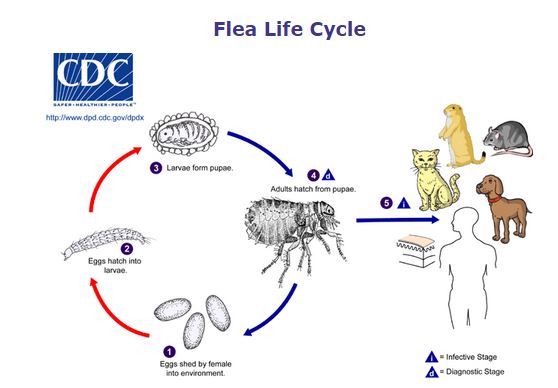What are fleas?
Fleas are small blood sucking insects that live on cats, dogs, hedgehogs, rabbits and various other species of wildlife.
The adult fleas lay eggs that fall out of your pet’s coat into their environment-your carpets, bedding, and furniture. One flea can lay up to 50 eggs a day! The eggs hatch out and release larvae which feed and then pupate. Pupae can remain dormant for many months, eventually hatching (stimulated by vibration, carbon dioxide and warmth) into young adults. 95% of the flea life cycle occurs in the environment – the fleas you see on your pet are therefore just ‘the tip of the iceberg’.
What problems do fleas cause?
The major sign of flea infestation is scratching. There are other causes of scratching but fleas are the most common cause that we encounter.
A number of pets develop an allergic reaction to the saliva of the flea bite and become hypersensitive. Just one bite can trigger severe skin disease in these individuals. Typically dogs persistently nibble over their back and rump and will eventually lose their hair. Cats tend to develop a scabby reaction along their back and neck called miliary eczema.
Excessive grooming and nibbling causes loss of hair over their back and groin.
Severe flea infestations in puppies and kittens can cause blood loss and anaemia.
Fleas are involved in the transmission of tapeworms.
'Fleas And Tapeworm'
Can fleas infest humans?
Ctenocephalides felis (cat flea) is the most common type of flea found on both cats and dogs. They will bite humans, but they will not survive and stay on us – they much prefer our pets!
How do you treat and control fleas?
This has to be considered a two-pronged attack:
1. Killing the adult fleas on your pet
2. Dealing with eggs, larvae and pupae in the environment.
How to get rid of a flea infestation
- Correctly apply a pipette of your veterinary supplied ‘spot on’ treatment to all the dogs and cats in your home. You must make sure you use the correct size for each of your pet’s weight. This will kill any adult fleas on your pet within 24 hours. It will also kill any more that jump on and sterilise their eggs so they don’t hatch.
- Vacuum your home thoroughly moving all the furniture, even if you have wooden or laminate flooring. This removes some but NOT ALL of the eggs, larvae and pupae.
- Wash all your pets bedding at 60°C to kill any of the immature stages.
- Thoroughly spray all floor space in your home with a veterinary recommended household insecticidal spray. Remember to do everywhere your pet goes including the car. This kills flea eggs and larvae in your home but it DOES NOT kill the pupae.
- There is no product available which kills pupae so you must encourage the pupae to hatch out so they will jump onto your pet and be killed by the ‘spot on’ treatment. To do this you must provide warmth, vibration and humidity by turning up the heating and vacuuming to generate warmth and vibration.
- Continue to let your pets have their usual run of the house to allow the new adult fleas to jump onto your pet and be killed.
- Continue vacuuming and treatment with a ‘spot on’ product all year round for all your pets as it can take several months to remove a flea infestation from your home.
A common reason for disappointing results when using ‘spot on’ treatments on your pets is that the fleas in the environment are not dealt with. There is a vast array of veterinary supplied spot-on and spray products which are safe and effective to use on your pet and in the environment.
Another reason we see animals with fleas is due to ineffective treatment. While some other products available elsewhere may be cheaper, they are often not effective or cause reactions. All our products are safe, easy to use and effective so you will save yourself money in the long run by using the right product the first time.
If you are unsure on what treatment is best for your pet, then please feel free to come and talk to your receptionist, veterinary nurse or veterinary surgeon at your local branch of Cinque Ports Vets. We will be able to advise you on the best products for your situation.
Useful links:
www.itsajungle.co.uk





